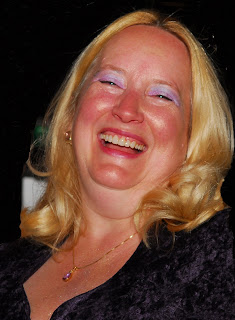As I kind of use this blog as a conversation with yawl, my "Dear Readers...", I decided to start a little project I am calling "Tuesday Tidbits" in which I will be posting a collection of what I consider are interesting facts on various subjects. If you also want to play along, drop me a line and I will mention it here. And if I can get inspired, I might even come up with a cool button to go along with this.
Today, I give you some of the facts that I use to help me overcome that twinge of regret at "the road not taken", namely "Why I should be glad I'm NOT an astronaut..."
- It stinks. Literally. And we are talking nausea-inducing smells sometimes. While the current ISS is not nearly as bad as the old Russian MIR space station, and after an hour or two the sensation wears off, those first few hours can be very hard. Where do the smells come from? Well along with the outgassing from plastics and synthetic materials, you of course have a mixture of various body odors from astronauts who have not really had a good shower during their entire tour of duty and who have only one set of clothes. And of course various lingering food odors, and the residue odors after the food has been "processed" by the bodies of the various ISS personnel. (See below where I talk about the toilet). Oh yes, there are fans and scrubbers and additional oxygen is added, but just ask any sailor who has served on a submarine...these devices are far from perfect! Yes, the human nose is adaptable and very few visitors to the ISS will really complain about the small inconvenience this poses, but the fact remains...it stinks!
- At some point in time, everyone who travels to space gets space-sickness. The space docs know this is caused by the inner ears being confused by the lack of gravity and the visual cues also being mixed up. Sometimes it is not only nausea, but also headaches and loss of body and limb sense. Can you imagine not knowing where your arm is? Seriously, it doesn't sound like fun. I mean I've been on dates in college where the guy claimed to not know where his hand was, but I think this is a bit different...
- Weightlessness may make the scales go to zero, but it makes you look fat. We are talking serious bloating here. Fluids shift upwards and towards your extremities, sinuses congest, faces get puffy, we are talking some of the worst symptoms of PMS here. Not attractive!
- In addition, weightlessness causes bones to lose calcium and increases the chances of forming kidney stones. Here I am already fighting osteoporosis on the ground, and outerspace would do even more damage in a very short period of time. Not only that, it causes muscles to atrophy and the heart to shrink. Can you imagine how much extra exercise those astronauts have to do to combat those problems. (I hate exercise by the way, so this really is a negative for me!!) The fact that one gets taller (up to 2 inches or 5 cm!) is some compensation, but it only lasts while you are in space.
- Sleeping arrangements are kind of odd. Most astronauts attach their sleeping bags to the wall of their little cubicle. Except there are only 2 cubicles and usually a minimum of 3 crew members. The odd astronaut(s) out are allowed to attach their sleeping bags anywhere inside the space station. Astronaut Susan Helms slept in the huge Destiny Laboratory Module by herself while she was living aboard the International Space Station. Some of the shorter astronauts, who of course do not suffer from claustrophobia (something astronauts are screened against), have even made a nice little nest for themselves in the larger storage drawers.
- While the astronauts are scheduled for 8-hours sleep periods, their circadian rhythms are often thrown off by the 16 sunrises per day. Shuttles command crews have even more difficulty when they try and sleep in the cockpit with bright sunlight and warmth entering the cockpit every 90 minutes, though sleeping masks do help. The good news is that most snorers are reported to stop snoring while they are sleeping in space.
- It is a good thing that most astronauts don't snore in space, as all noises are heard while living in such cramped quarters. At least those that are above the ambient noise level which has slowly been rising as more and more experiments and equipment is installed on the ISS, although some improvements have been made. All ISS astronauts used to have to wear earplugs all day, but now are only required to wear them 2-4 hours per day. That did not stop two ISS crewmen from suffering permanent hearing loss during their 6-month stay that ended in April.2006, as reported by Russian authorities, though NASA refuses to comment on the health of individual astronauts. The living quarters of the ISS is the noisiest module, with current goals in the sleeping cubicles at a maximum of 50 decibels (dB) and in the work area of 60 dB. Decibels are measured on a logarithmic scale, meaning 60 dB is 10 times louder than 50dB. For comparison, most window air conditioning units or washing machines or your electric toothbrush operate at noise levels of around 50 dB, while phones, alarm clocks and vacuum cleaners operate at around 60dB.
- While there are some funny videos of ISS crew members eating in space, in truth it is more of a chore than a pleasure. While swallowing in zero gravity is not really a problem, getting some flavor into what astronauts swallow has been. Salt and pepper spices in liquid form have been included. All food is canned dehydrqted or otherwise packaged so it doesn't need to be refrigerated. In fact, there isn't anything served cold on the ISS, it is either heated or served at room temperature, nor is their any fresh fruits, vegetables, etc. Most things have some sort of sauce on them so that they will stick to a spoon, a fork is not needed. And of course the antics of squeezing things from plastic pouches and maneuvering food from containers to mouths requires a lot of concentration. It is not a good idea to have bits of dinner floating about in the space station...
- Which brings us to the next topic...going to the bathroom in space. NASA did make an attempt a building some sort of waste elimination facility into its space suits, which meant a fitted condom attached to a waste packet for men and a molded gynecological insert for women...but it gave up and passed out diapers to all. Both the shuttle commode and the ISS have bathrooms, but using the toilet requires that crew members precisely align themselves in the dead center of the seat. A mock-up of the toilets is used during astronaut training, complete with a built-in camera and personal technician to aid in viewing the video to assist in training all the crew members on how to position themselves. One would definitely have to lose one's modesty in order to become an astronaut... Oh, and I guess I should also mention that just recently, while the ISS was boasting of its largest complement of crew members, 13 in total, one of the two toilets failed. It came close to being a real crisis before they got it repaired.
- While zero gravity may at times be fun, returning astronauts report extreme difficulty in moving and controlling their arms and legs after touchdown. But the biggest adjustment comes for crew members who have spent longer terms in outerspace who say they have to remember that when they let go of objects, they fall!
- And of course there are the dangers no one wants to talk about, like radiation. Radiation inside the ISS, as on the former Russian space station Mir and the Space Shuttle, is actually released by the materials that make up the vehicles and is caused by the cosmic rays colliding with the hulls, releasing secondary particles. While the exposure of a crew member spending around 3 months time in this environment amounts to the equivalent risk of someone on Earth getting radiation from natural sources in one year, it is therefore deemed an " acceptable risk". The problem is, that the effects of this kind of radiation on the body are not well understood. And there is not clear way to translate the estimated radiation exposure into the increased risk of cancer. One study puts an estimate of a 20% higher risk of dying of some kind of cancer, and a number of crew members who have spent 6 months or more in this kind of environment have already shown chromosomal abnormalities. It is therefore impossible for authorities or even the crew members themselves to make an informed decision about the potential damage their job may be doing to their health. Sounds pretty risky to me...
- And then the biggie, the vacuum of space. Now science fiction movies like to show people exploding. Actually, you wouldn't explode, unless you were holding your breath, in which case the sudden depressurization would cause your lungs to rupture. But lack of oxygen in your blood would be what kills you, and that would take about 2 minutes, and you would probably be conscious the whole time. Of course it wouldn't be pleasant, as water on your tongue and eyeballs would boil away (not from heat, but from the lack of pressure). Scientists know this from and experiment where a space suit failed and the tester was exposed to near vacuum for 15 seconds. Thus far there have not been any ruptures to the ISS and it has had a number of hits from micro-meteors which have damaged several systems, but nothing critical...thus far.
So, once again I have talked myself out of any regrets about not following that career path. I'm glad I wrote this down, as sometimes I do have to go back and read it to remind myself, especially about the camera in the practice toilet...!

Tune in next week for "It's Not Easy Being Clean..."





4 comments:
While this list made me laugh out loud, I still think you should've been an astronaut. Cause you are that smart, talented and brilliant.
I got so close, I am convinced that if there are multiple universes where one of ourselves follows one path while the other goes a different direction, then there is another FA in the multiverse that went down that road and beat out Sally Ride!!
Maybe the worlds will collide one day and you'll meet her, a la Sliders ;-).
Personally I'm fairly claustrophobic and the mere thought of being cooped up like that sends shivers down my spine that are nearly as bad as those caused by the thought of that toilet cam!
Yikes
And then there's tourists that want to visit?
And astronauts that go twice?
Post a Comment